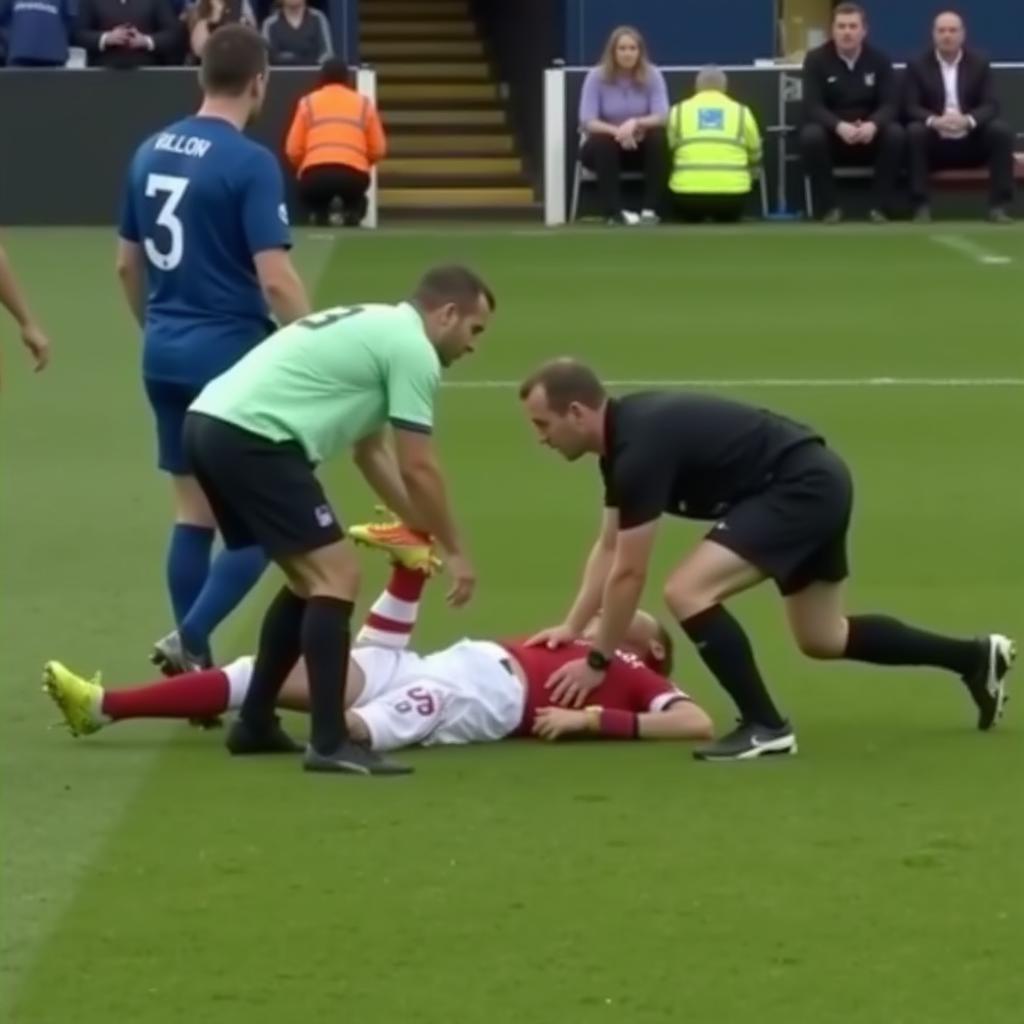Referee Trips Player: A Look at Controversial Calls and Their Impact
December 27, 2024When a referee trips a player, it’s a moment that can ignite fury, spark debate, and potentially alter the course of a game. These incidents, though rare, raise questions about officiating standards, player safety, and the overall integrity of the sport. This article will delve into the various aspects of referee-player collisions, examining the causes, consequences, and controversies surrounding these unusual events.
Why Do Referee Trips Happen?
Refereeing a high-level football match is a demanding job. Referees are constantly moving, tracking the ball, and positioning themselves for optimal viewing angles. In the midst of this dynamic environment, accidental contact with players is sometimes unavoidable. A player might suddenly change direction, a referee might misjudge a player’s movement, or the sheer speed of the game can lead to an unfortunate collision. These incidents are often unintentional, a byproduct of the fast-paced nature of modern football. However, there are instances where a referee’s positioning or lack of awareness can contribute to such incidents.
The Impact on Players and Matches
 Player Injured After Referee Trip
Player Injured After Referee Trip
A trip by a referee, even an accidental one, can have serious consequences. A player might lose possession in a crucial moment, miss a scoring opportunity, or even suffer an injury. In some cases, the tripped player might react angrily, leading to further disciplinary action. These incidents can disrupt the flow of the game and create tension between players and officials. It’s important to acknowledge the potential impact these events can have on the outcome of a match, especially in tightly contested games.
Controversial Calls and Debates
Refereeing decisions are often scrutinized, and incidents involving trips are no exception. Debates arise over whether the contact was accidental or intentional, whether the referee should have been better positioned, and what the appropriate course of action should be. Some argue that referees should be held accountable for their actions on the pitch, just like players. Others emphasize the difficult nature of officiating and the need for understanding in such situations. Such debates often highlight the complexities and nuances of refereeing in professional football. It is situations like these that perhaps warrant further discussion regarding player safety, such as that experienced by cầu thủ phí minh long.
Preventing Future Incidents
Improving referee training and emphasizing awareness of player movements could help reduce the frequency of these incidents. Technology, such as video assistant referees (VAR), can also play a role in reviewing controversial calls and ensuring fair play. Clearer guidelines on how to handle such situations could also be beneficial. Even implementing discussions on appropriate leveling practices, similar to those involved in nạo vét cầu ngang thủ đức, could benefit overall field awareness. These are just a few areas where improvement could potentially mitigate these incidents in the future. Just as cầu thủ lam trains to improve, so too must referees.
Conclusion
Referee tripping a player, whether accidental or intentional, is a disruptive event that can have significant consequences. While these occurrences are relatively infrequent, they underscore the challenges of officiating in a fast-paced and dynamic sport. By fostering open dialogue, improving training, and leveraging technology, we can strive to minimize such incidents and maintain the integrity of the beautiful game. Remember, fair play is essential, even when discussing the performance of a mount cầu thủ. It’s a vital element in achieving the next lên cấp cầu thủ.
FAQ
- What happens if a referee trips a player and it leads to a goal?
- Are referees ever punished for tripping players?
- How can technology help prevent referee-player collisions?
- What is the role of VAR in reviewing such incidents?
- How can players avoid being tripped by referees?
- What are some examples of controversial referee trips in football history?
- How does referee training address the issue of player collisions?
Common Scenarios and Questions
- Scenario: A referee trips a player during a counter-attack, preventing a potential goal-scoring opportunity.
- Question: What recourse does the team have in this situation?
- Scenario: A player exaggerates the impact of a trip by a referee.
- Question: How can officials determine if a player is simulating?
Further Reading and Related Articles
- Refereeing controversies in football
- The role of technology in officiating
- Player safety in football
For any support, please contact us at Phone: 0396443476, Email: [email protected] or visit our address: 23 Tháng 3, Đắk Nia, Gia Nghĩa, Đắk Nông, Vietnam. We have a 24/7 customer support team.